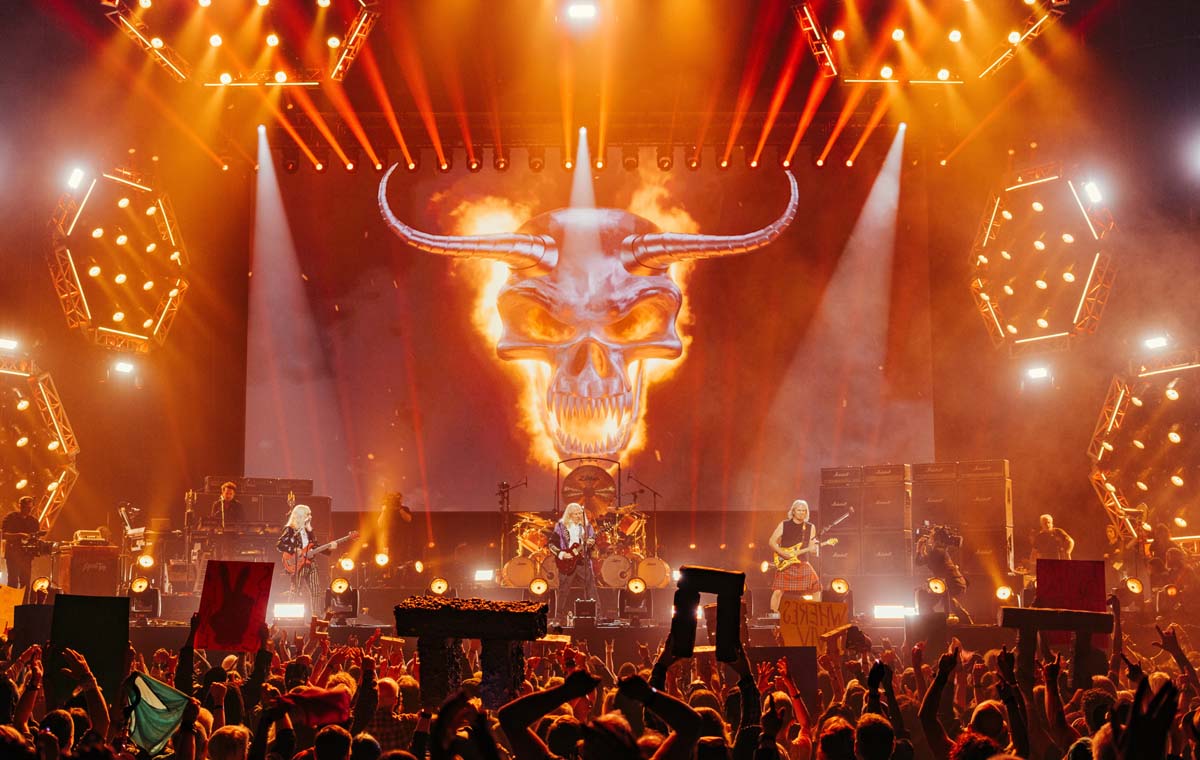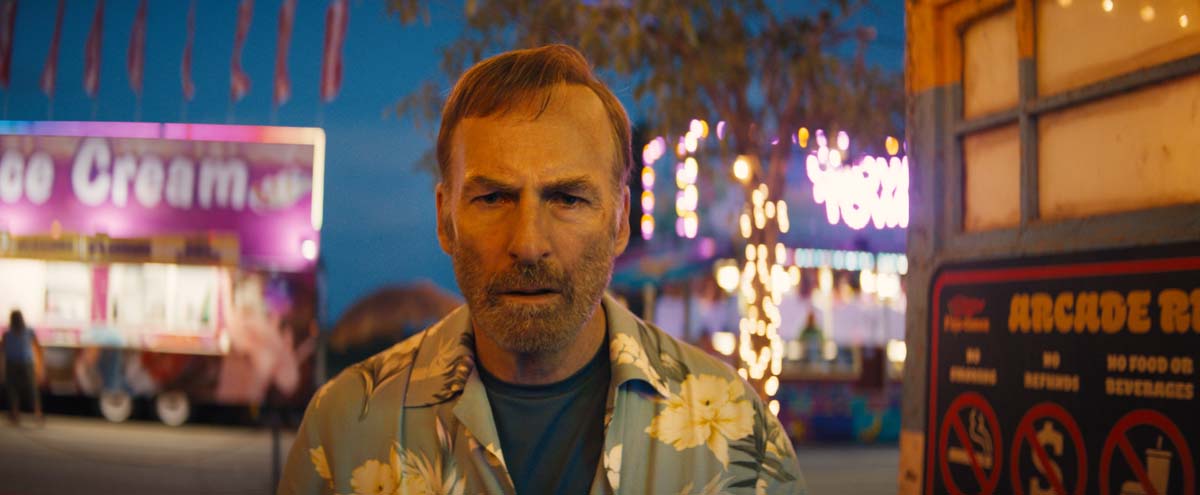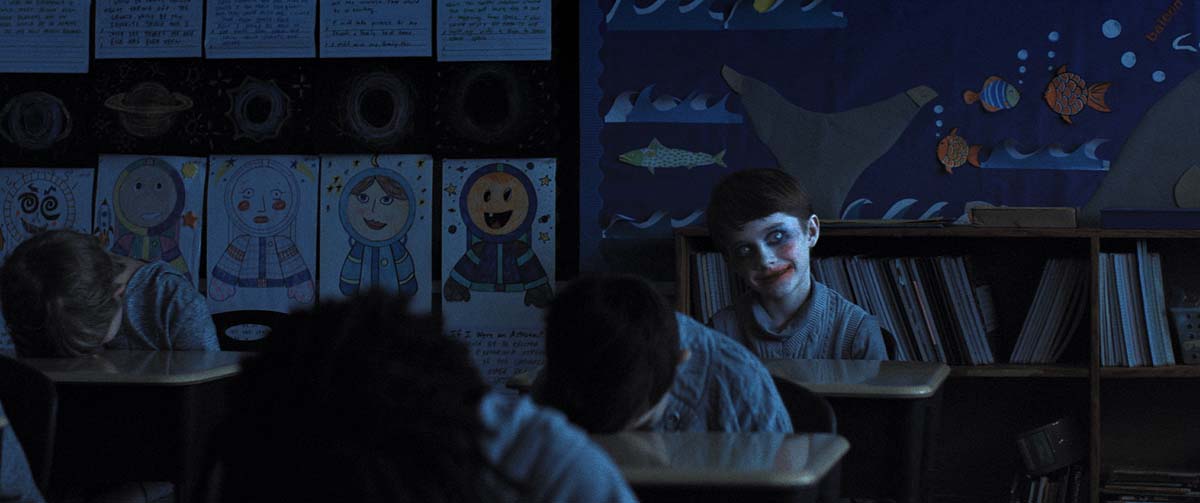Him
Leaning into the film’s themes for inspiration and how Taylor used her own sports background and her father’s Super Bowl-winning career to lend authenticity to critical scenes.
Today on Art of the Cut, it’s my pleasure to speak with ACE Eddie-winning and Emmy-winning editor, Taylor Mason, ACE, about the film Him.
Taylor has been on Art of the Cut before for the feature film, Birth/Rebirth. She has also edited A Black Lady Sketch Show, Dahmer: Monster - The Jeffrey Dahmer Story, and Pose. She’s also been an assistant editor on Bladerunner 2049, Dune, and DC League of Super-Pets.
Taylor, it is so good to see you again. Congratulations on a great movie. I loved it and I can’t wait to talk about it.
Thank you. I’m excited to be back and chat.
Your film, Birth/Rebirth was the last time we talked. First of all, with this movie, the theme of religion is pretty prevalent. Crucifixes, blood… Tell me about how that influenced you or how you incorporated that into your edit.
The theme was really established at the script stage. The initial commentary is about how fandom creates a religion out of sports and football. It’s life or death. You see how people react when their team wins or loses.
Religion became the vehicle to describe a lot of the contradictions within the sport and the dedication of oneself to the sport and the sacrifice being made within the sport. All of those things are embodied in religion or religion embodies them.
That’s the theme reinforced throughout - through production design, through camerawork, through music - a lot of our kind of cues have choral elements, just trying to reinforce that idea that this is more than football, this is more than just a sport. This is people’s religion.
Even the idea of idols, right?
Yeah. Blind worship. At some point, Isaiah is being seen as a god and then we discover that he is not God, but one of God’s fallen angels.
It comments on that and also asked the audience to question their own dedication - not specifically to religion - but to anything that they think is great.
And ask them what they’re willing to sacrifice for this greatness and if it’s worth it. I hope that’s what audience members are leaving with, or at least asking themselves.
There’s a great audio montage right at the top of the movie as they discuss the historic eight wins. Can you talk about what you did to build that and how audio played into your picture cutting?
That one went through a few different phases. I think the opening of the film really makes a statement. We really wanted to just throw the audience into this curated fantasy of greatness.
It was really intentional to hit the audience with this hyper-stylized, commercial, sizzle reel supercut that does a few things.
It introduces our protagonist, sets this hyperbolic, uncanny valley football sports world that we’re in, then also sets some stakes because we are immediately met with this idea that this great player, Isaiah White, could be replaced.
The style, the quick montage, the bravado was really meant to reflect the language of modern sports. It’s performative. It’s seductive.
In the room we talked about trying to create something that would seduce the audience - almost how we imagined young Cam being seduced when he was a kid.
We had several iterations attempting to achieve that spectacle as well as give us some background and exposition.
That’s where the voiceover came in - to replicate what we hear on ESPN with their commentating. The opening did several things and it evolved throughout post.
What were some of the reasons for the evolution? What were the creative thoughts from where it used to be to the way it became?
I think it’s just trying to build the world. We wanted to do so very quickly and efficiently, so we can kind of get right into the story and the inciting incident, and we didn’t lose the audience. Montage was the best way to deliver that information.
Originally we started off in the living room, then we started playing with this Nike ad aesthetic, and we just built on it. As we were able to incorporate more information, we just kept building and building.
It’s a lot coming at you and we were aware of that, but we really wanted it to feel as realistic as those kind of sports packages we see on TV, where you’re just getting all kinds of stats and facts and figures, and there’s all this like glitz being thrown at you - almost so much so that you can’t really even question what’s really happening - the nature of the actual sport that everyone’s glorifying.
Then later on, when the characters start to unravel, the whiplash of it all feels a little bit more disorienting, especially when we come to a halt later on in act one when we get to the compound and things really slow down.
It was definitely intentional. We built it throughout the course of post.
Did you feel like you needed to watch those kind of sports packages to get the feel of them and the pace of them, or was that just kind of ingrained in your head from watching football?
I think it was ingrained. I have seen enough of it in my lifetime. But it was also this “Him” world version of a sports package. It wasn’t exactly what you see on Fox Sports, ESPN, CBS. It was an uncanny valley version of a sports package. You have Isaiah crying blood!
You don’t see that on TV every day! [Director Justin Tipping]’s got style through and through. He came from the music directing world and just loves these really cool, flashy cuts and throwing great imagery in there, so was just inspired to try everything. We ended up with this supercut HIM sports package.
Did you watch anything that the director had directed before to kind of get a sense of pace he likes?
I watched a lot of his television work. Flatbush Misdemeanors is one of my absolute favorites, which is an absurd comedy. I think a lot of that absurdity was injected into this film. The comedy especially. Yeah, his Joe vs. Carole series has a lot of style, especially with the camera moves.
It’s bizarre in the best way. His work really reflects how all-encompassing football is and the spectacle of it all. He was really dedicated to exploring the contradictions within it.
And he did so using a lot of these stylistic choices - a melted skeleton popping in and the title cards and all of that, in an effort to show the juxtaposition of glitter and gold, but also violence.
You mentioned the inciting incident. I’m assuming that’s the attack on Cam. Do you consider that the inciting incident?
Yeah.
And that’s a time jump right there. He’s attacked and then we go straight to him in the hospital, right?
The transition is a jump in time. It was scripted that way. It’s just cause and effect. Get us right into the movie. Then we try to explore some of the more complex emotional reactions that he would have after that point - after he gets to the doctor’s office and it really sets in that this is potentially really detrimental to his career.
That’s when we continue to explore that. We didn’t feel the need to see what happens right after the hit, and then him getting to the doctor’s office and his family freaking out or anything like that. It was intentional.
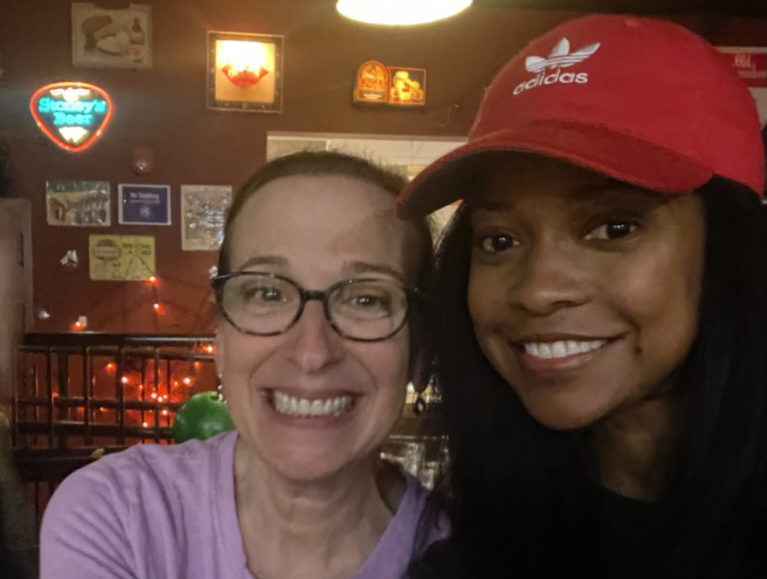
1st AE Jenny Davidoff Cool and editor, Taylor Mason, ACE.
Like you said, cause and effect editing is one of the best ways that you can tell a story. This happened, and because of that, here’s what happened next. There’s another great, sound design moment at the combine when Cam is getting his haircut. Can you talk about that whole combine section? That’s another inflection point in the film - Cam deciding to go to the combine or not perform at the combine.
We really wanted to get as internal as possible, starting on the escalator in the scene before, and we’re just inundated with these photographers and questions and people asking egregious questions after he just got this diagnosis.
So the haircut scene is just an extension of that with him really trying to grapple with the potential loss of his career. He’s getting all these text messages of people congratulating him and in the background his family is arguing if this is healthy for him and what he should or shouldn’t be doing.
Everyone has a say but him. He’s just sitting there as a tool in the process. Then eventually when he gets nicked with the razor, he breaks. It was definitely his deciding moment where he says, “No! I want this!”
Then the decision is made for him that he’s going to sit this one out, but at least at that moment we know that he would have gone for it, regardless. This is truly what he wants. So when that is taken away, it’s that much more devastating.
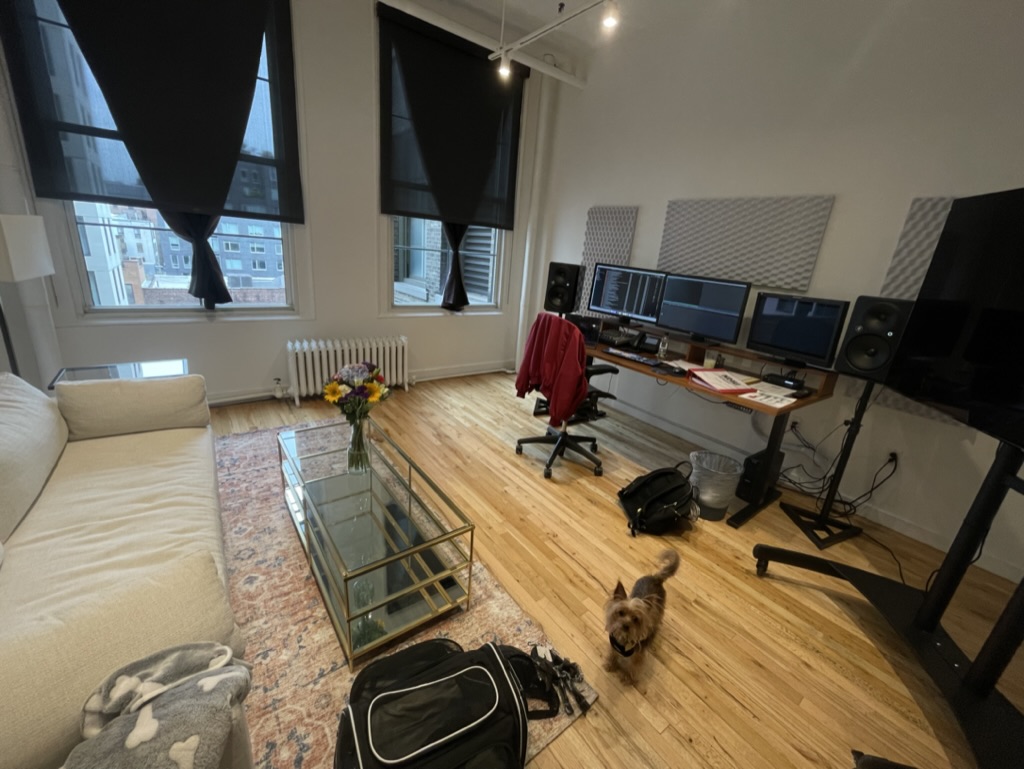
Taylor’s cutting room
Let’s talk about the choice to separate the days with graphics.
It was scripted that way. Because the film and just the nature of the story explores so many ideas and themes.
It was necessary to have these anchors for the audience throughout the film - not only ground the audience and providing an anchor for them, but to represent what Cam was meant to be learning through the course of the film - and also make us question if he did learn it or not.
This wasn’t really discussed in the room, but in my mind - when reading the script - I saw these day cards as representative of the week of football where each day is dedicated to something as it leads up to game day. I thought it was kind of poetic.
Talk about the Day One montage.
The day one montage was after Cam and Isaiah meet for the first time, then they start to practice - throwing the ball around. It was a quick montage set to Gucci’s “Lemonade” which is why I like it so much. It’s one of my favorite songs that I grew up with in high school and college.
It’s a fun moment. One of the few fun moments we’re going to get with these two before all hell breaks loose. It’s seeing the mentor/mentee dynamic play out and see them get along and how brotherly they are and how kind Isaiah is and how much of a good coach he is.
It allows us to disarm the audience and get them very comfortable so that when Isaiah does end up showing his true colors, we’re shocked and engaged. It was another one of those hyper-stylistic, music video-esque montages.
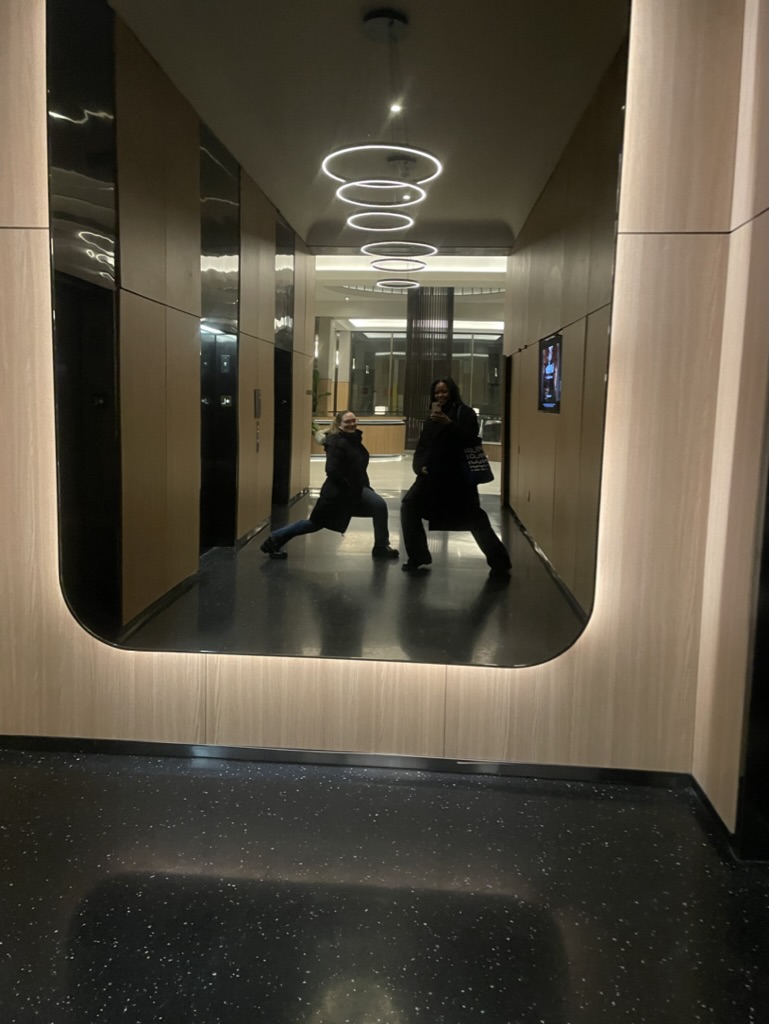
Taylor and 2nd AE Noel Bodhan
Was that song scripted or did you suggest it, or the music supervisor?
No, we actually were going to use something more classical. We were thinking to just pay tribute to the sport, to make it feel like a waltz - the throws and the catches at 48 frames per second would be really poetic and dreamy, but I think it just felt a little more natural - especially with their banter and giving each other a hard time and all of that - to have something upbeat and fun.
Gucci was something we experimented with later, and I’m so happy that we got it.
Angela Leus, our music supervisor, came through! She got us so many great “needles.” Often, I thought, “I’m just going to temp with this because it’s fun. It sets the tone and I know we’ll have to replace it.” But she got us some amazing cues with great new artists and old artsits.
It was a dream come true to work with this kind of music. Shout out to Angela for coming through. And
Bobby Krlic didn’t just put together the soundtrack with these new artists.
What was really cool is that he incorporated a lot of the actual score into these new needle drops. They actually produced new music with the score and these artists, which is great.
Bobby and Justin are just huge music enthusiasts and have libraries just stored in their head. To be able to pull out something great at any point in time and test it against picture was a huge asset for me.
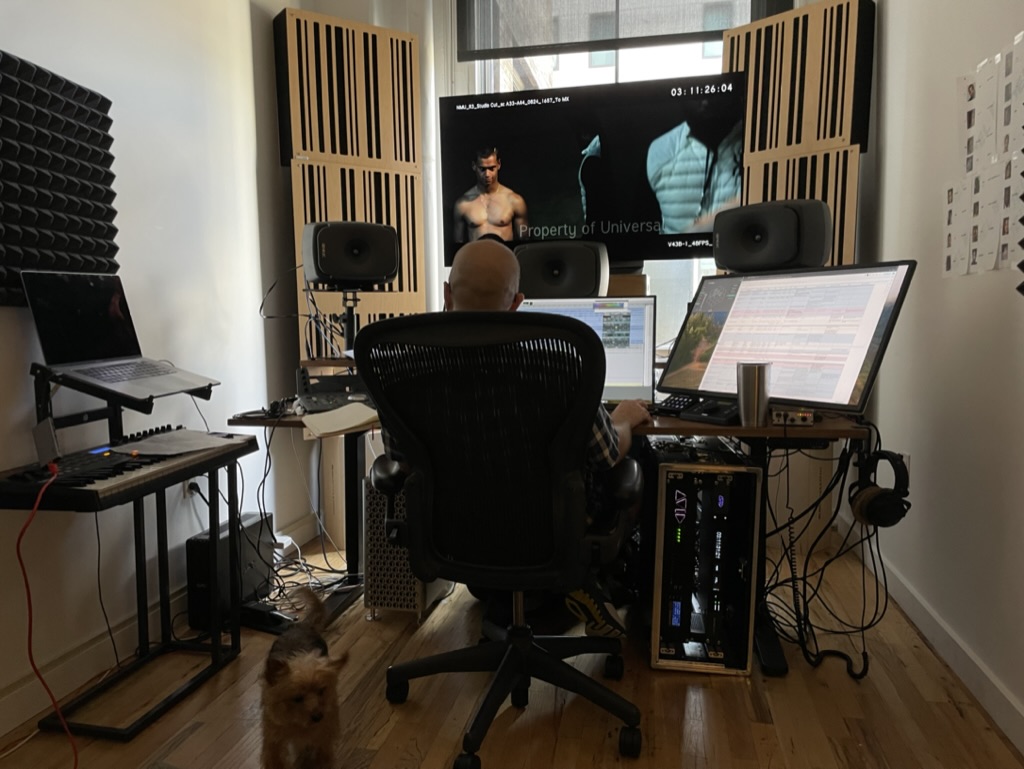
Music Editor Jim Bruening
But it must have meant that you did a lot of these montages and scenes without music. Dry. Did you cut them all dry to start with? Or did you have some kind of temp in there?
I don’t like to cut montages to music. I know it’s hard to picture that, but I find that it influences my cutting decisions too much. I let it kind of cut for me.
I end up cutting with the beat and it’s too staccato and too monotonous, so I try to just cut without it based on my internal rhythm and the performances and the momentum of what’s going on in the scene.
Then I’ll throw a song in there, maybe midway, when the scene is still pretty rough, but at least the bones are down and I’ll see how the song plays.
Usually if it plays well – if it’s in the pocket - then I’ll know that the cut is decent and can continue, then finessing from there. I usually start it dry. It just feels better that way.
There’s a really interesting music choice during Cam’s physical, where they strip him down and try to weigh him and measure him and all that stuff.
That was another moment where we wanted to explore the contradiction. He’s getting this physical, which is obviously normal before any kind of huge training week, but it’s more invasive than most.
He has to strip down, step on the scale in the middle of these strangers - these medical professionals who are strangers - who end up poking and prodding and measuring him, kind of like chattel.
Isaiah White is just talking to him about something innocuous at that moment. Then we’re met with this very whimsical score that Bobby wrote to distract us from all that, to basically make us feel like, “Oh, this is commonplace and create this paradoxical tension between those two things.”
It’s very intentional. I know it’s unexpected, especially after hearing “Lemonade.” It’s very much part of exploring the contradiction. And it’s poetic.
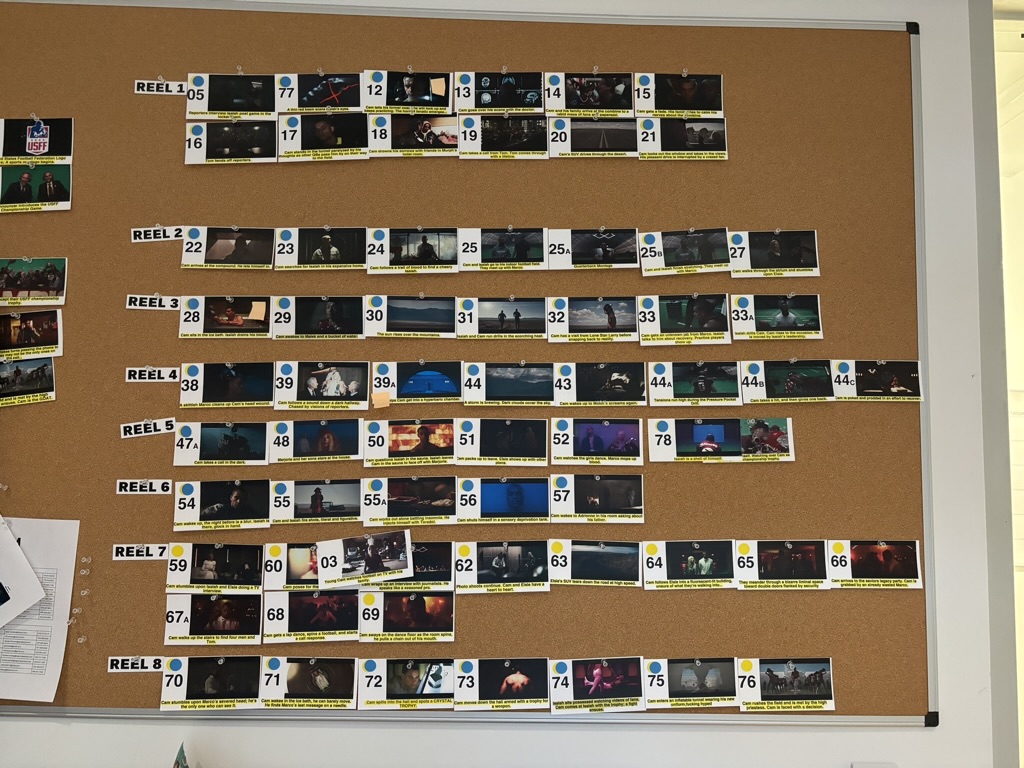
Story cards on a wall for HIM
Did you temp anything in there?
I think we temped with Beethoven and Chopin. I’m not sure which symphonies, but we started with classical and then Bobby made it his own and created something much more whimsical and appropriate. The goal was always to create the contradiction within that scene.
Talk to me about the “two second drill” scene. That’s kind of where I things start to feel weird in this movie. There was a hint of weirdness earlier during the physical, but that two second drill is where you’re realizing things are not what they seem here.
Yeah, that’s the first moment we understand that Isaiah is not the hero we all thought he would be. Cam is tasked with pivoting and throwing to his receiver in under two seconds, and we quickly see what happens when he doesn’t execute.
His teammates is bludgeoned with a football coming from a Jugs machine at however many miles per hour.
That was one of my favorite scenes. When I read that on the page, I was instantly transported to my own experience in undergrad, playing volleyball and being punished - and my team being punished - because of unforced errors in drills.
I was ticking a little bit, but also very excited to explore those feelings. And I really tried to inject the angst and the shame and the embarrassment that comes along with letting your teammates down in that scene. It was a perfect opportunity to explore how time-dependent and rhythmic football is.
Every single moment was treated like a note in this harmony that created this composition. From his throws to the coaches to his teammate getting hit with the Jugs machine, the cursing, all of it played a role in creating this music composition and when Bobby laid his music down, felt full and became like a symphony: a brutal and bloody symphony.
It’s where we first are introduced to how dangerous this film was going to get. How far we’re probably going to go.
And this is only the beginning of act two, so we’re probably going to go much further. It was definitely my favorite for those reasons. I really appreciate Justin and Bobby for letting me be so precious about it because I was so attached to it initially and letting me really play around.
I did not know you were a volleyball player and I can totally understand how that experience would lead you to cut that scene and be able to understand the pressure Cam was under it.
It was cool. It brought me right back to that feeling. Instead of Cam standing in front of Isaiah, it was me in front of the net. This is what I was envisioning while cutting (Taylor holds her hands above her head).
So it was super helpful and hopefully made it feel authentic and very scary.
The more you can empathize with a character… I think that we’re empathy machines - people in general, but editors for sure. I love that your sports background allowed you to empathize with Cam for many reasons.
I have my own personal experience with athletics, and I played every sport known to man coming up and then landed on volleyball in college, but I also had a very intimate relationship with football because my dad played for the Raiders and won a Super Bowl with them in ’81.
He had about seven surgeries after retirement, then continued to deal with those injuries, but also experience the fandom and the excitement all around it. So I had a very interesting relationship with the sport that I think really informed a lot of creative decisions in this film for both me and JT.
I think it really helps, especially with performance, choosing things that I recognized from my own history, especially with my dad and as a family member of someone going through that, how proud they were and how excited they felt when other people’s days were brightened by the presence of your father being around and wearing a Super Bowl ring.
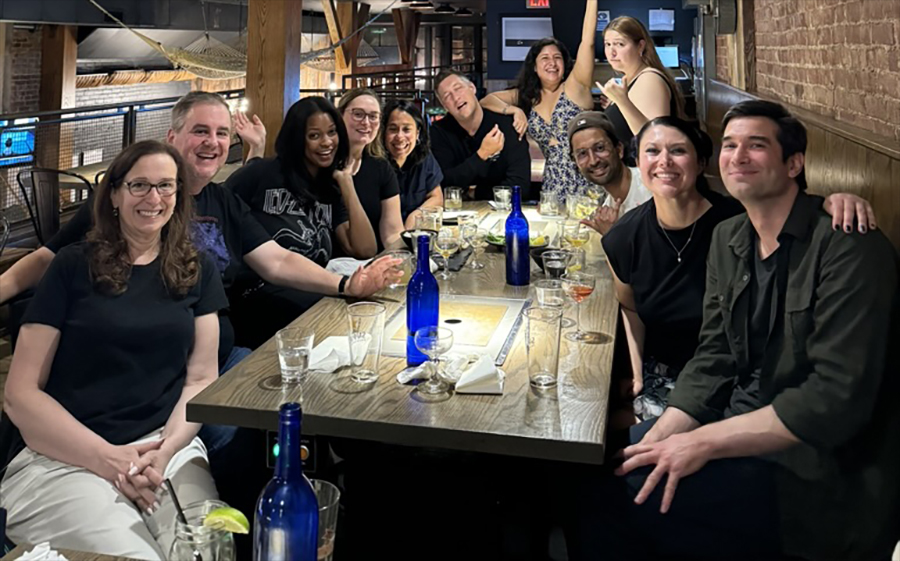
Post Crew! Jenny Davidoff Cook - First Assistant Editor, Sean Stratton - Post Production Exec. Universal: Taylor Joy Mason - Editor, Noel Bodhan - Second Assistant Editor. Monica Barraza - Visual Effects Producer, Andrew Woolley - Visual Effects Supervisor: Rebekah Hernandez - Post Supervisor, Petra Friden - Post-production Assistant, Justin Tipping - Director, Alexa Hale - Visual Effects Exec. Universal, Alec Styborski - Visual Effects Editor
I remember trying to wear his Super Bowl ring when I was a kid, and I had to put three fingers in it just so it would fit. Injecting some of that into the process when looking at performances. It really came in handy. My experience was always in the back of my mind when I was cutting.
So during those quieter moments with Isaiah and Cam in the spa and they’re really having a vulnerable discussion about the game and what it means, especially to Isaiah and how much he wanted it and how it’s all he has. It was very close to home.
My history with the sport helps make those moments feel a little bit more authentic. It was part of the reason why Justin was interested in me for this project specifically, but we also had a history of working together. We we went to AFI (American Film Institute) together.
He was a year ahead of me, but we were aware of each other and the work that we had done. We had a mutual respect for that.
Since then we’ve had over a decade of working together, staying in touch loosely through side projects, then had our first real project together in 2019 on a half hour comedy called Twenties for BET.
There are a number of things that helped me and this project come together in a way that felt organic and almost inevitable. I am really fortunate and thankful to Universal and Monkeypaw for taking a chance on a newbie.
You are not a newbie! Come on!
OK, but first studio film.
I was going to ask you whether they knew about your football background.
I think Justin told them. Every director has to pitch their choices for their team. I’m pretty sure he let them know that. “She’s not new to this. She’s true to this.” (quoting facetiously from Gang Starr lyrics)
It’s in my bones. It’s in my DNA. I have a strong perspective that could hopefully lend well to the story we were trying to tell.
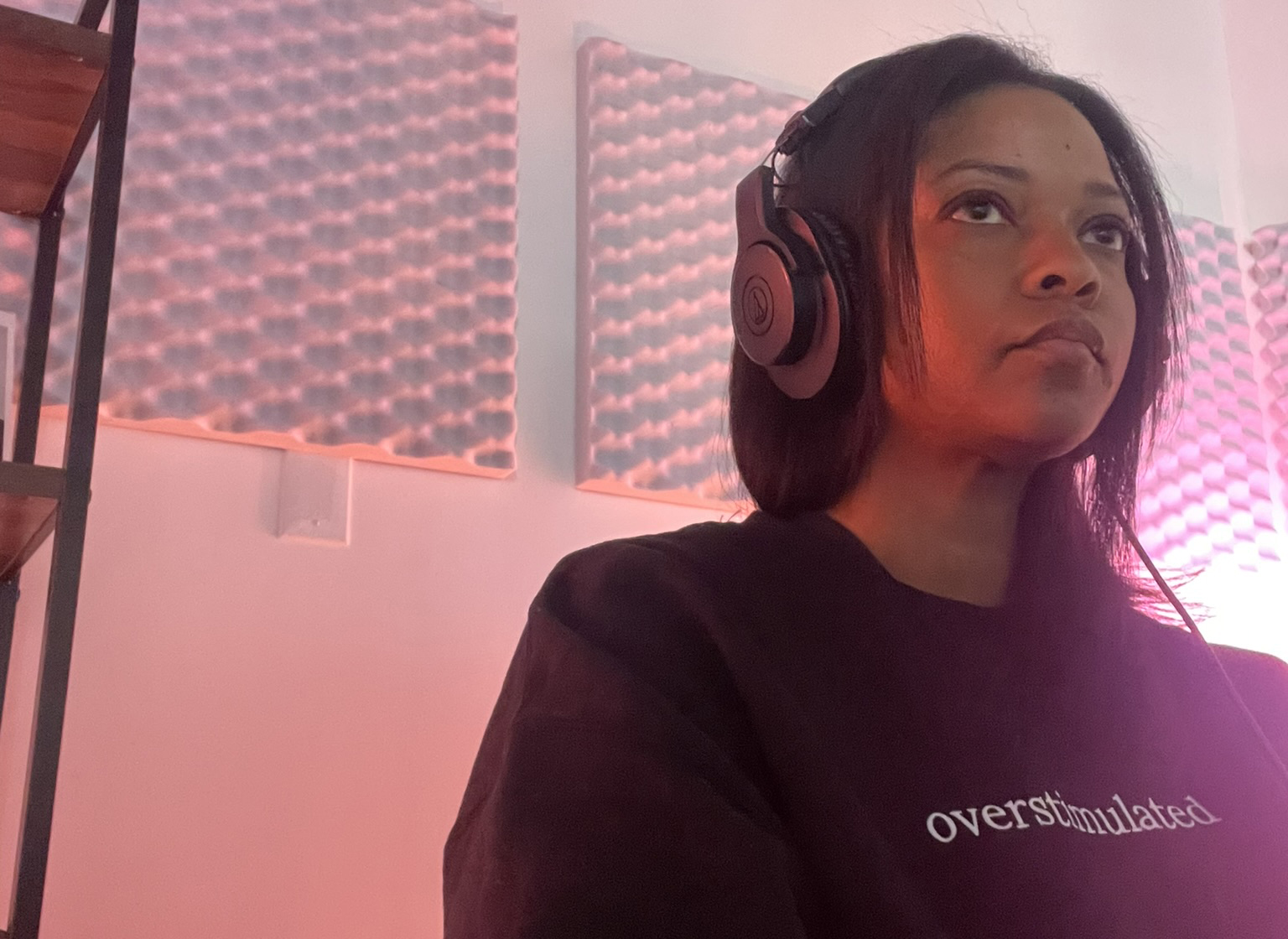
Taylor locked in
I learn something new about my friends every single day! That’s very cool. Let’s talk about the mom’s voice playing while Cam’s in the hyperbaric chamber. Was that ADR? Was it scripted? And how did you build the the terror of that - the kind of descent of his mind as he’s in that that chamber.
The voice actually came from a scene that we did not include in the film. Cam has a conversation after one of the football drills and he’s calling his family, saying, “I don’t know what’s going on. I don’t know what’s happening.
I feel like I might be in danger,” but we don’t see the other side of the conversation - which is his family at home having a party. It’s his mom’s birthday, so they all get on the phone and talk to him and tell him, “It’s okay.
Everything’s gonna be fine. This is an opportunity of a lifetime.” We really kept it like that to make it feel like he is truly isolated and his family is so far away.
They feel far away to us as an audience. So we actually took the mom’s side of that conversation and laid it over that hyperbaric chamber scene, as if it’s a message that Cam was not receiving on his phone. She left that message, but Cam doesn’t have access to his phone.
It was another kind of poetic juxtaposition where his mom’s telling him that everything’s going to be okay, but it’s clearly not okay. She tells him to keep his head screwed on tight, then he bashes his head against a window.
It’s very dark and kind of sad because his family is not experiencing or seeing everything that we are and doesn’t realize how much trouble he’s in and vice versa. He doesn’t realize that his mom is trying to reach out to him. It’s kind of dreadful. It’s the best way to incorporate his family without making him feel safe.
You and I have talked now about two pretty freaky films: Birth/Rebirth and now Him. Both films were definitely scary and disturbing. Do you have to protect yourself from that darkness in any way?
There was some weird stuff that I had to cut. I shake it off. I think I’m shaking it off. Starting from Monster (2022 TV series) that’s what I kind of learned. There’s stuff I do in my personal life - like turn on cartoons when I get home to decompress from this stuff, but I really do love it.
I love exploring it. think horror is a great genre just because it is all encompassing. I think you can experience every genre within that.
There’s a lot of laughter in this film, especially at the end when it gets absurd and violent, but you’re still laughing, so I think I’m able to experience all of the feelings on films like this, which I really appreciate. I also get to flex those genre muscles in the edit.
If there’s anything I’d want to maybe focus on next, it would be psychological horror or definitely drama is one I would love to take a stab at.
Honestly, horror and comedy might be the most difficult tones or genres to work in, so I imagine the drama could be a nice little vacation.
Every project is challenging in the best ways, and it’s for different reasons, but if I wanted to take a break and find some reprieve, it would be in the drama genre.
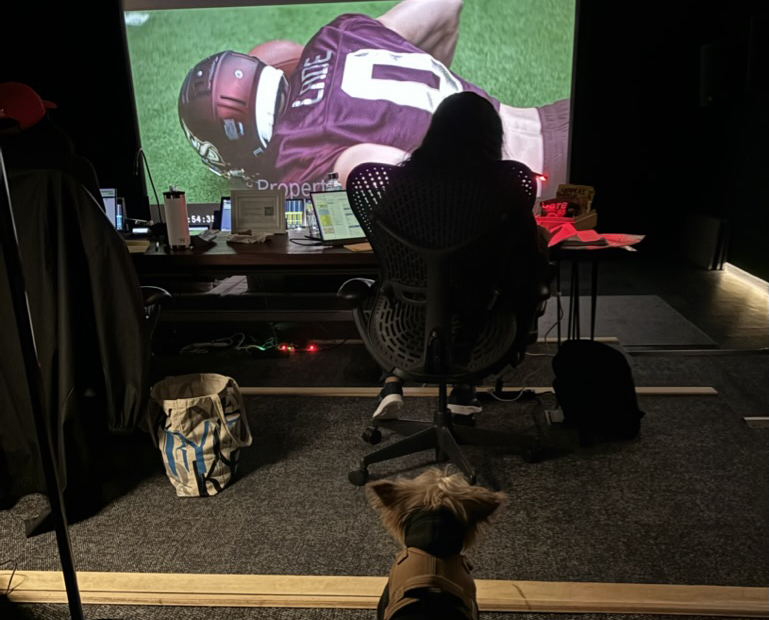
Taylor and Charile on the Mix Stage in NYC.
The ending of the movie made me think of you with the famous Thelma quote about where someone asked her if it was hard for her to work on movies that were so violent and she replied, “They’re only violent when I get done editing them.”
Perfect! I need to get that framed somewhere. Also I’m very happy to be in any sentence with Thelma Schoonmaker.
When you get in dailies – for a scene like one of the “hallway” scenes in Isaiah’s house – the shots themselves probably don’t have a lot of tension, so how do you build that tension in the edit?
It really is just about anticipation. Kind of like when you’re doing jump scares, when you have to distract the audience’s attention or focus it on something outside of what they’re supposed to be scared of eventually.
And they’re staring at this one thing and trying to figure out what it is on the screen, then all of a sudden - from the other side of the frame - something jumps out, then the whole audience - after focusing on this moment - is freaked out.
It’s kind of like that, but in a longer form - just kind of distracting the audience, diverting their attention and slowly creeping this anticipated dread in.
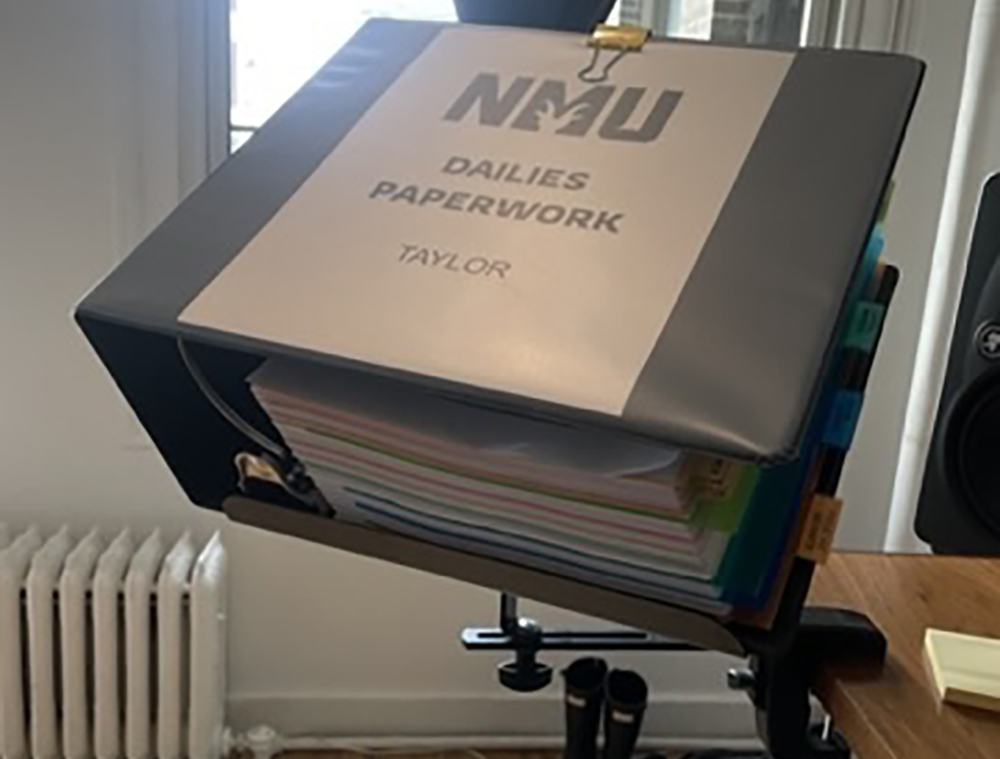
Production Bible for HIM
It varies obviously depending on the behavior. In that scene in particular, there’s this hallway that kind of leads to nowhere and everywhere. Cam’s a little lost. We’re discovering this hallway with him because it is it feels like almost a carnival funhouse.
It’s an uncanny version of a hallway. Then he’s hearing Isaiah’s football commentary behind the door. At least we think it is. Or is it someone screaming bloody murder? We don’t know. So we’re focusing our attention on this door and we want the audience to lean in as well.
So then when there’s a ball drop, and we suddenly get a little freaked out and our heart rate increases a little bit. Then we have that vacant door moment where there’s a lot of negative space and you have no idea what to expect. We get that little silhouette behind him - that dream-like fanatic silhouette.
So there are all these elements that just pop out.
I think that’s kind of where the tension lies: in between those moments. Then there’s the photographers and the Saran wrap - all meant to be in his head- and it all leads up to those moments of his biggest fears.
Let’s talk about the sauna scene. I’m really interested in the spotting of music. I think it starts with music and then the music stops and then the rest of the scene plays without music. Did you temp it that way or what was the discussion around the score spotting?
We temped it with a bunch of different “needles” throughout. I think maybe in the last month Bobby created a cue that broke in that moment when he’s choking and it hit us all so much harder. We thought, “Oh, you really feel the strain, the dread.
It became much more visceral without it, just hearing the sound of the bench and the steam in the room and all of those elements were far more scary than the music that we had underneath, so we just kept it like that.
It just felt right, and emphasized the moment and it was different from what we’d done mostly because it’s almost wall to wall music in this film, so it was a nice break from that and into a very grounded attempted murder.
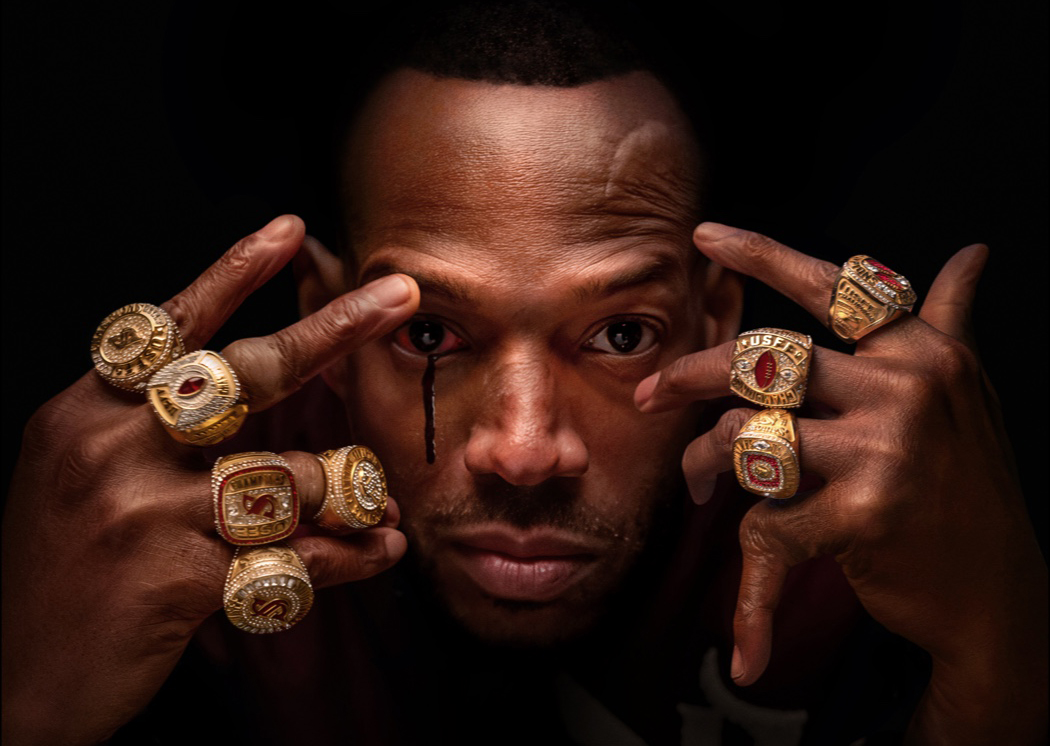
Let’s talk about intercutting a little bit. You can talk about any set of scenes, but my recollection is that there was intercutting between a scene of Isaiah’s work out and a scene of the owner meeting about Cam.
We were trying to contrast Cam’s ascension and Isaiah’s descent. The audience knows that Isaiah is aware that Cam is getting this kind of attention, so he starts to work out and get ready for what’s next. That’s what that intercutting was about.
Just a play between what the two are actually experiencing at that moment. That leads into a supercut of the biggest party known to man with strippers and Cam having the time of his life and all the while in the back of our heads we’re thinking that Isaiah is up to undermine that at some point.
What would you like to talk about? Are there any specific scenes or challenges?
The entire movie or tone was probably my biggest challenge - the approach to the film. I lean heavily on subtext and nuance and very quiet editing.
I try not to be seen too much or noticeable, but this film really required me to be loud and boisterous and very visible.
That was kind of scary for me initially. No matter how close I was to the subject matter, it was just the tone itself and the kind of bravado that I needed to have was scary.
But I think when I let go of this instinct to live in the quiet and to pull back, I started having a lot of fun with it.
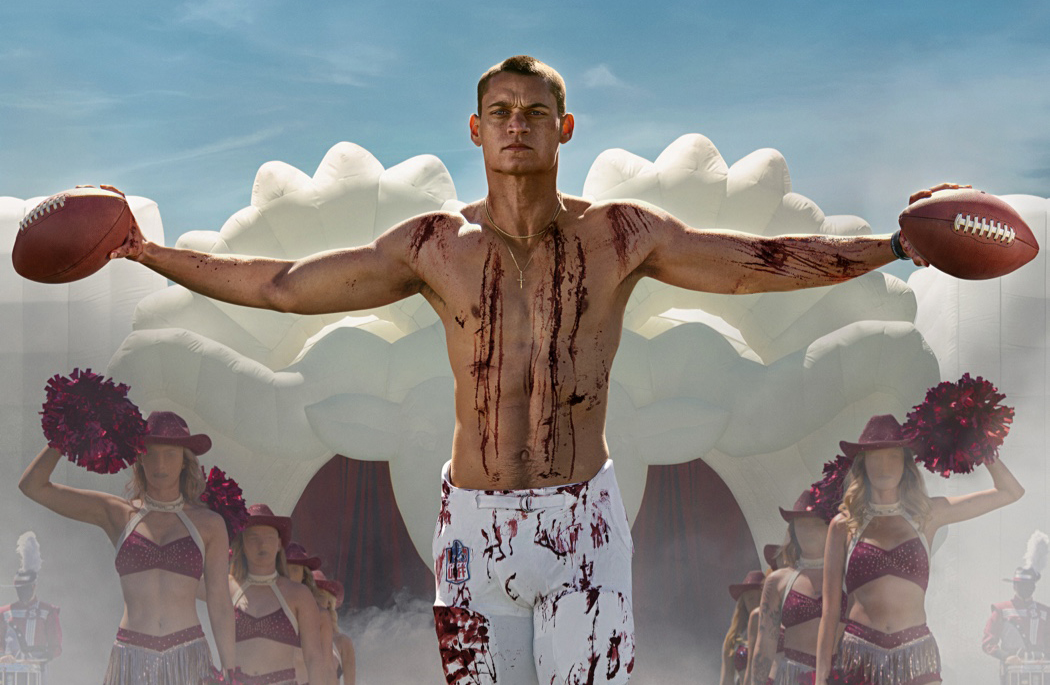
JT just experimented and tried any and everything. There were things that I would have questioned on other films easily that we did with our eyes closed on this one, and that was really nice.
It felt liberating. I felt like I was really stretched creatively, and I feel like I have become a better editor for it. And if anyone comes to me and says, “I want to do this hyperbolic, super-stylized, film” I’d say, “Yeah! Let’s do it! Let’s go!” without hesitation.
When you read this script, could you tell that that was going to be the requirement for the editing?
Yes. Also, from just knowing Justin’s style, I knew that it was going to be style style style, because he’s got swag, sauce, style, all of it.
So I had an idea for sure, but when the footage lands on your desk, you have to say, “OK, I got this!” It hits you differently. So I think I grew because of that in a lot of ways.
I’m so appreciative that this film came in my life for that reason.
You knew you couldn’t cut that footage quietly, right?
Yeah. It dictates everything and it also speaks to the camera work. Kira Kelly was our DP, and we didn’t even have to talk much.
We couldn’t because there just wasn’t a lot of time, but the footage speaks for her. I kind of know how shots are intended to be used based on how they’re composed and how they’re framed, and what has more weight in the frame and how they’re lit and things like that. It was super inspiring.
There are so many ideas I have based on this one image. You only have so much time to put a movie on the screen, so you just have to make a choice, and go with it.
Can you give an example of how the footage - the weight or the lighting or the composition - speaks to you about how it needs to be used?
There’s this desert scene where Cam and Isaiah are shooting rifles at targets. It’s expansive. You’re in this huge desert. It’s just the two of them.
They’re meant to feel extremely far away from the compound - outside of safety. The scene itself and the imagery being so sparse, I got the feeling that it was supposed to feel unsettling, so I tended to use more breath in between dialogue and create this uncertainty between Cam and Isaiah that communicated this idea that we don’t know where Isaiah’s head is right now and what he’s going to do to Cam.
Is there a dead body in that mascot costume? Because we had these very horizontal plane, flat images that made you feel like you’re this little speck in this large world with nowhere to go for help.
Then, of course, you have these bright suits that were so loud, but no one was seeing them. It almost called for this very unsettling, isolated, siloed emotional experience for the characters.
I love the idea of putting the breath in there to give you uncertainty. I’ve talked to other editors about cutting dialogue very tight to show how certain a character is: they’re so smart and they’re so certain of their choices that the dialogue is rapid fire. But If you open that up, that adds an incredible amount of uncertainty. It’s so unsettling. I love that, Taylor! It’s so good talking to you. I love chatting with you. And, congratulations on a great film. I hope your next one gets to be a drama.
Thank you so much. Me too. So happy to be here. Always great to talk to you. I can’t wait to do it again on the next drama or psychological horror or whatever. I’ll take it!









